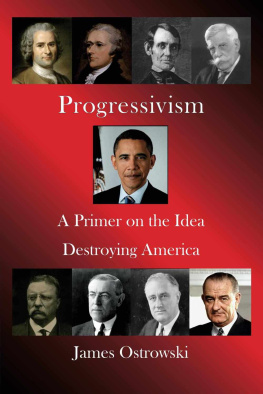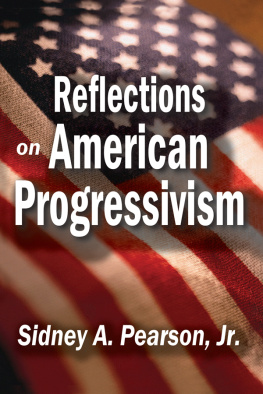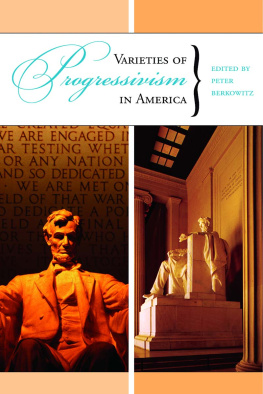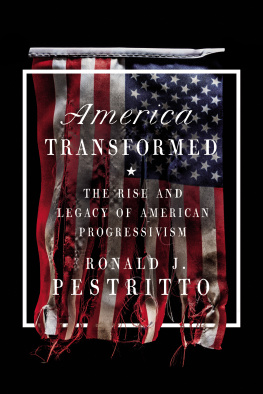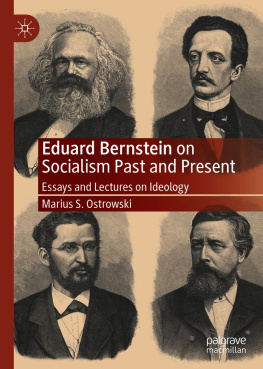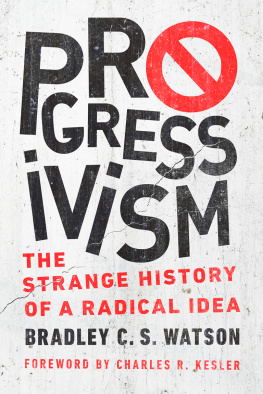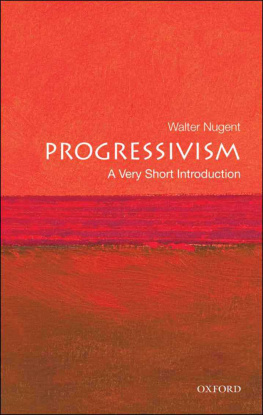Progressivism
A Primer on the Idea Destroying America
By James Ostrowski
Cazenovia Books
Buffalo, New York (U. S. A.)
LibertyMovement.org
Copyright 2014
By James Ostrowski
All Rights Reserved
Published by Cazenovia Books, Buffalo, New York
Printed in the United States of America
ISBN 978-0974253-87
First Edition
In Honor of
William J. and Mary V. Ostrowski
When the wine stirred in their heart their bosoms dilated.
They rose to suppose themselves kings over all things created
To decree a new earth at a birth without labour or sorrow
To declare: We prepare it to-day and inherit to-morrow.
They chose themselves prophets and priests of minute understanding,
Men swift to see done, and outrun, their extremest commanding
Of the tribe which describe with a jibe the perversions of Justice
Panders avowed to the crowd whatsoever its lust is.
---City of Brass, Rudyard Kipling
Contents
Acknowledgements
Foreword
Introduction
1. What is Progressivism?
2. We Are All Progressives Now
3. The Origins of Progressivism
4. The Failure of Progressivism
5. Progressivisms ArchenemyTrue Liberalism
6. Progressivisms Vanquished FoeConservatism
7. War is the Health of the Progressive State
8. Progressivism as Utopianism
9. A Rogues Gallery of Progressives
10. How to Bury Progressivism and
Restore American Liberty
Conclusion
Bibliography
Index
About the Author
Acknowledgements
This book was conceived and chapters outlined on Sunday, April 15, 2012, the holiest day on the progressive calendar. I also had in mind the effective end of the second Ron Paul campaign and was cognizant of the need to continue the Revolution after the campaign ended.
Due to the day job, it was a struggle to finish the first draft by July 15, 2014 and prepare the book for publication.
I want to thank all the people, especially my family and friends who, without any hope of personal reward, aided in my many political endeavors over the years. I cant possibly name them all but I remember each of you and I will never forget your kindnesses. Please know that I have never given up the fight regardless of temporary setbacks. This book, which your efforts helped produce, is proof of that.
My intellectual debts are also too numerous to mention. Three stand out. My late Father, William J. Ostrowski, a brilliant lawyer and passionate civil libertarian, taught me how to think critically and logically. If I have accomplished anything as a lawyer, it is because I am the only graduate of the W. J. O. School of Law.
Second, Thomas Jefferson. He has many critics and was much better out of office than in it, but no one can deny that he stated the basic doctrine of liberty earlier and better and with greater impact than almost anyone else.
Finally, Murray Rothbard, whom I had the honor of knowing. I can honestly say that I was his student, having attended his seminar in the history of economic thought in the 1980s in Manhattan. His influence is felt throughout the book which is no surprise since the first time I heard him speak in 1979, the subject was the Progressives and World War I.
In researching this book, I have relied heavily on a group of libertarian scholars affiliated with the Mises Institute: Ralph Raico, Tom Dilorenzo, Tom Woods, Guido Hlsmann, Hans-Hermann Hoppe and Robert Higgs. I also greatly benefitted from the works of two other prolific libertarian scholars, Jim Powell and George Smith.
Finally, a special thanks to the man who has been the unofficial leader of the Liberty Movement since Murray Rothbard died in 1995Lew Rockwell. I have benefitted from his voluminous and lucid writings, his website, LewRockwell.com, which I read daily and write for occasionally, and from the vast online resources of the Mises Institute which I used innumerable times in the preparation of this book. Please support the Mises Institute and LewRockwell.com.
*************
Please note that I started a website, LibertyMovement.org, to carry out the strategic and tactical ideas proposed in the book.
James Ostrowski
Buffalo, New York
October 2014
Foreword
This book is the culmination of forty-five years of involvement in politics. My Father became a judge when I was four years old. The first campaign I actually worked on was his re-election campaign for Buffalo City Court in 1970 when I was 12 years old. Even before that, I would overhear Mom on the phone talking about the latest political news. It was Mom, not Dad, who unwittingly taught me my first lessons about politics: it was a dirty rotten business filled with scoundrels. Nothing I was to learn from firsthand experience in politics and later anti-politics ever contradicted Moms first lesson.
From about 1975 through 1979, I worked furiously inside the Democratic Party trying to reform politics and defeat the machine. In 1978, at age 20, I ran a competitive race for New York State Assembly in the Democratic Party, forcing the party to import party hacks from all over the state to support the machine candidate. An Assemblyman from the Bronx knocked on my next-door neighbor Carls door. Imagine the chutzpah! Carl told him to go peddle his papers somewhere else.
I joined the Liberty Movement in 1979 having discovered Murray Rothbard via Ayn Rand and Robert Nozick who cited Murray and tried to refute him in Anarchy, State and Utopia , a book assigned in Paul Kurtzs course in political thought at the University of Buffalo.
Thus, this book is the product of 36 years of intense involvement in the Movement in a variety of different capacities. Since the Liberty Movement is fairly new, dating from about 1968, I have been involved in it for the vast majority of its existence. And, because the movement was very small when I got involved, I very quickly got to know many of the key figures including Rothbard. There has never been a time in the Movement when I did not consider myself a Rothbardian. I did not meet Ron Paul until much later (1988) but served as his election law attorney in New York State in 2008 and was heavily involved in both of his presidential campaigns. I have worked with many of the key Movement organizations over the years including the Mises Institute, the Cato Institute and the Libertarian Party.
My experience in electoral politics is quite diverse. Over the years, I have been active in the Democratic, Republican and Libertarian parties. I have been involved in two major candidacies run on independent lines including a race for Congress that got national publicity. I was heavily involved in the early days of the Tea Party Movement but eventually left the movement after it was co-opted by the GOP and thereby self-destructed. I spent my first five years out of law school trying to end the drug war and wrote a major study for the Cato Institute on the subject. I have practiced election law for many years, largely because there were few lawyers around who would fight the machines efforts to remove candidates from the ballot. I have also been a paid consultant in recent years and have worked for a variety of candidates.
I say all this not to pat myself on the back but to provide the reader with a factual basis to judge my credibility in making what are admittedly sweeping and controversial assertions about the Movement and about the need to move away from politicselections and lobbyingand toward direct citizen action as our primary strategy. I did not come by the approach of direct action by pure cogitation and philosophizing as much as I was driven to the conclusion that direct action is our only real hope because all else had failed and failed repeatedly and dramatically! Those who wish the Liberty Movement to fail should continue to do what we have been doing and ignore the strategic and tactical proposals in this book.
Next page
